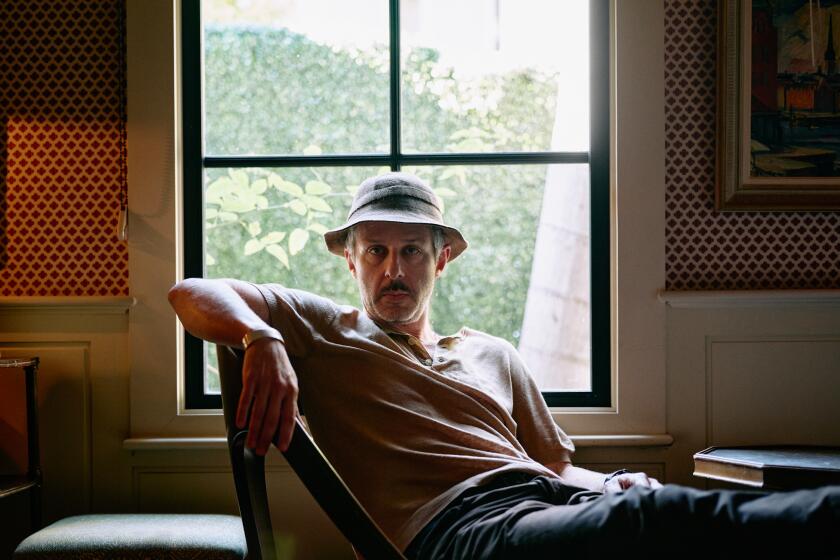Religious conflict, art and global pop culture
Art that spans global divides often relies either on the loveliness of gauzy universals or the shock of gritty minutiae. Chronicling a tumultuous period in the career of an urbane internationalist, the African music superstar Youssou N’Dour, filmmaker Elizabeth Chai Vasarhelyi tries to split the difference between these approaches in her documentary “Youssou N’Dour: I Bring What I Love.”
She shows a certain weakness for gorgeous words and pictures. N’Dour, who comes off as both highly intelligent and fairly down to earth, still tends to slip into Bono-esque inspirational talk (translated from the French) when interviewed. And Dakar, his hometown, often appears in a colorful, slow-motion haze.
But Vasarhelyi doesn’t bury all of her specifics in the feel-good fluff of “we are the world” rhetoric. They surface almost as incidentals that soon prove more powerful than the film’s more sweeping statements.
Here is Africa’s most popular living musician, getting flustered at the prospect of sacrificing a goat at a family gathering; pulling on a traditional robe after shedding his chic Parisian leisure wear as he prepares to take the stage at Carnegie Hall; adjusting the eyeglasses of his ancient and bedridden grandmother, who raised him and who died during this film’s production.
And here he is too playing for audiences across Europe, always making sure to hand the microphone to the immigrants up front when it comes time for crowd participation.
“I Bring What I Love” is best when exploring the nitty gritty of N’Dour’s life as a musician, favorite son and cultural ambassador.
And it’s most persuasive when it speaks through his music, which is both dazzling and full of fascinating detail.
N’Dour has released more than 20 albums since he pioneered the spiritually uplifting, danceable mbalax sound in the 1970s, blending Latin rhythms and soul with traditional African forms. In 2004, N’Dour -- a devout Sufi Muslim who wanted to cast international light on his nation’s version of the faith -- released “Egypt,” which brought together Senegalese musicians and an orchestra from Cairo to create a new Muslim devotional music.
Violating the Muslim taboo against mixing religious and secular expression, N’Dour sought both to modernize his own country’s approach to spiritual art and to show the world how Islam connects Arabic nations to Africa.
“I Bring What I Love” follows N’Dour and his international band as they promote the album in Europe and deal with the fallout at home -- declared sacrilegious, it was the singer’s first flop there in decades. The film’s insights are strongest when it dwells on those details of journeyman pop stardom and African city life. The twist that comes at the end is also brilliant: When “Egypt” earns N’Dour a Grammy, that American emblem of success, he goes from heretic to hero in one fell swoop.
Vasarhelyi, whose film about Kosovo, “A Normal Life,” won acclaim in 2003, is not a music specialist. “I Bring What I Love” begins with an overview of N’Dour’s work that’s tedious for fans and not that illuminating for newcomers. Things improve vastly once Vasarhelyi turns her lens on the problems that surrounded “Egypt,” which are resonant enough to transform an artist’s overview into an exemplary story about religious conflict, art and the global dissemination of popular culture.
It always comes back to the music. The concert footage around which Vasarhelyi organizes her story -- some of which was shot in Senegal, much during the European “Egypt” tour -- reveals why N’Dour is one of the world’s greatest pop artists. His singing effortlessly shifts between the conversational and the sublime, and as a bandleader, he continues to enact a revolutionary marriage of traditional forms and pop influences.
N’Dour is the film’s unstoppable force, handsome and radiating joy. He’s the kind of performer who is larger than life but always seems like one of the family. “I Bring What I Love” will be enjoyable to viewers who already know N’Dour’s work, but its great service comes in reminding American audiences that some of pop’s most powerful work takes place outside our borders.
--
--
‘Youssou N’Dour: I Bring What I Love’
MPAA rating: PG for thematic elements and brief smoking
Running time: 1 hour, 42 minutes
Playing: At Laemmle’s Sunset 5, West Hollywood; Edwards University Town Center, Irvine
More to Read
Only good movies
Get the Indie Focus newsletter, Mark Olsen's weekly guide to the world of cinema.
You may occasionally receive promotional content from the Los Angeles Times.










